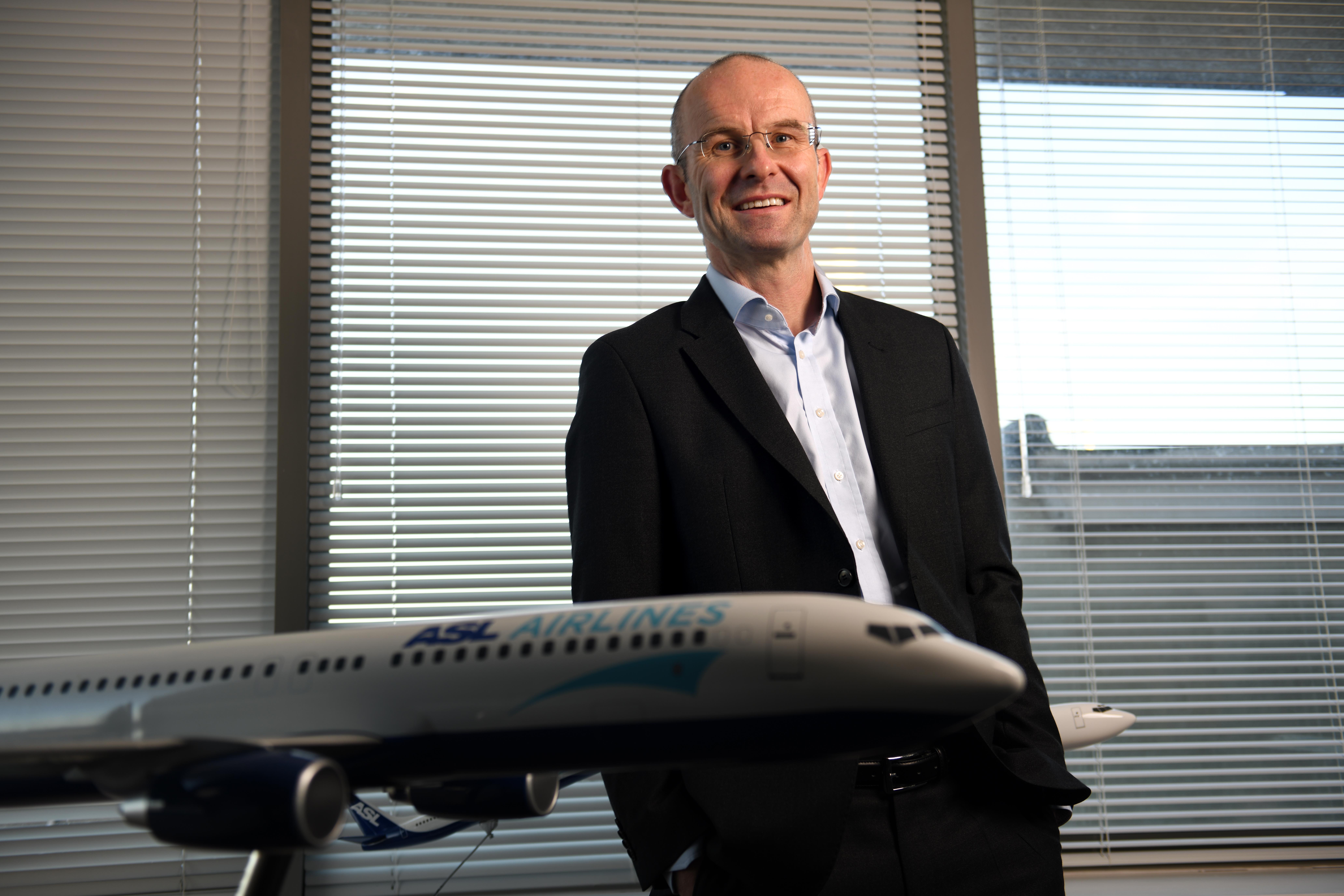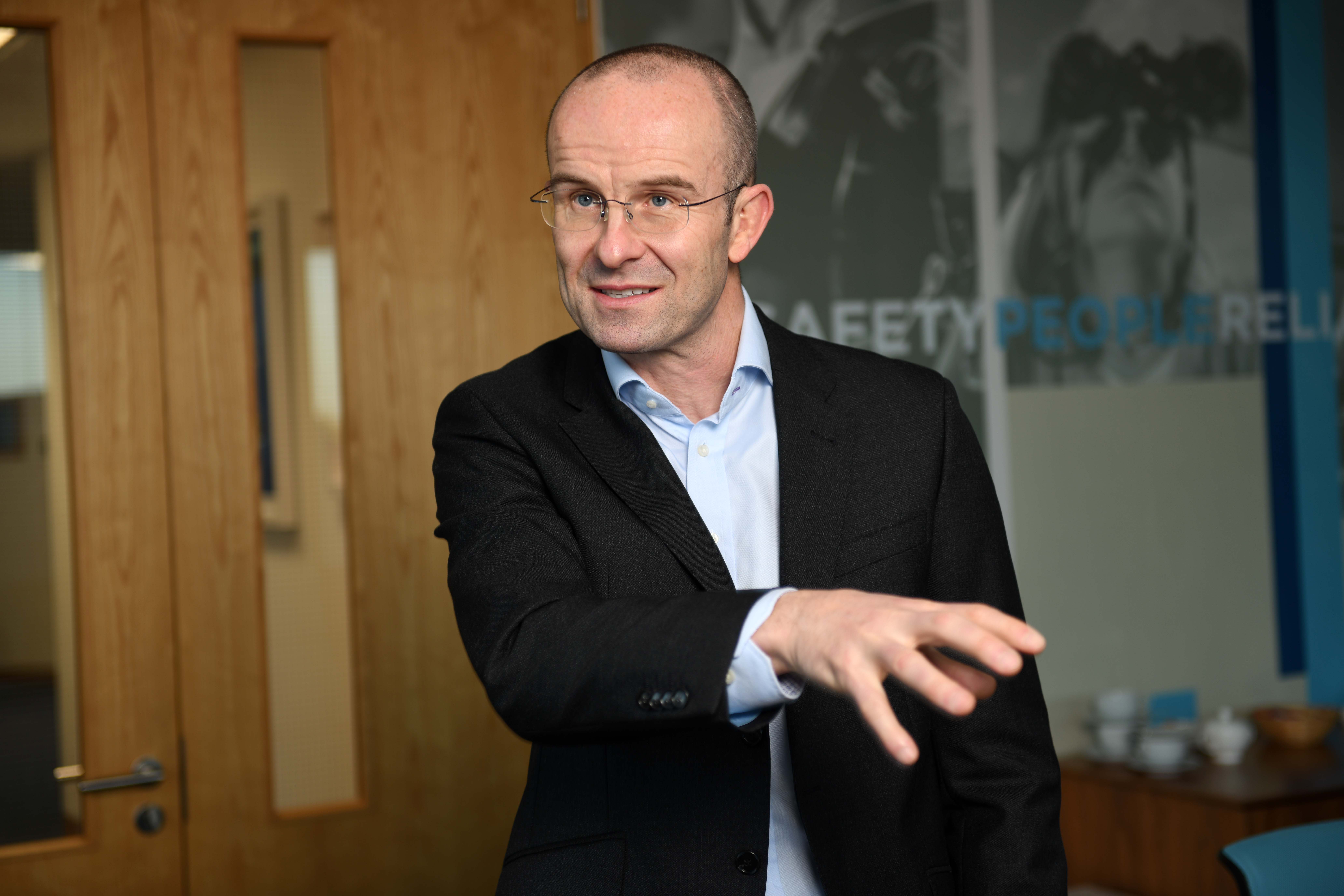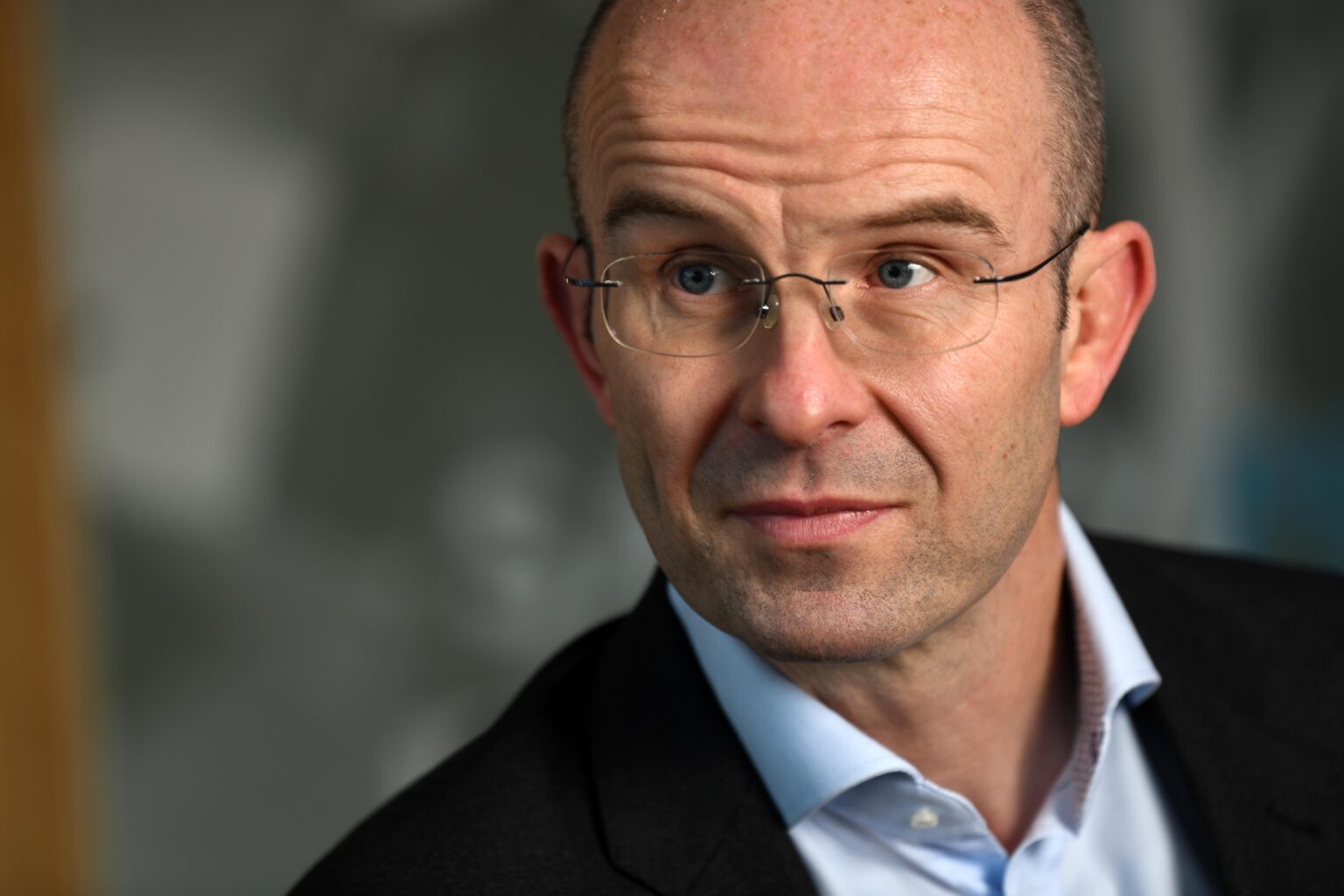There is an entire wall in the reception of ASL Aviation Holdings headquarters in the north Dublin town of Swords dedicated to a map of the world. It is dotted with the locations of the company’s global reach. And it is quite the span: last year, ASL carried more than one million tonnes of freight and four million passengers on 135 aircraft.
ASL is low-profile, but huge. It owns or part-owns seven airlines generating annual revenues of more than €1.2 billion.
Mark O’Kelly, a Dubliner who is ASL’s CFO, greets me warmly outside the fourth-storey boardroom in the Swords headquarters. The area is littered with large model aeroplanes, representing the many types of planes the business has flown over the decades. There have been Lockheed C-130 Hercules, Boeing 747s, and much more besides.
Having looked at the map, I joke to O’Kelly that ASL seems to be everywhere bar the North and South Poles. “We used to go there too,” O’Kelly retorts, explaining that, up until a few years ago, ASL flew Italian scientists on Lockheed L-100 Hercules to Zucchelli Station in Terra Nova Bay in Antarctica. The plane landed on an icy runway only accessible during its brief summer, while the Italians researched everything from offshore marine biology to glaciology to climate change.
Getting them there was just another challenge for a company that prides itself on solving problems for its customers.
For years, ASL ran one of the largest privately-owned fleets of Hercules in the world, but it recently retired the iconic aircraft. “Our Hercs have seen everything from food drops in Ethiopia in the ‘80s and ‘90s to ferrying UN and International Red Cross humanitarian aid to war-torn countries in Africa,” O’Kelly said, adding that ASL held an event in Johannesburg last month to mark the end of an era. “It was a pretty emotional day. Our pilots and team had grown up in the business, and they had some fantastic adventures, in what was a core part of our business for so long.”
Today, ASL has 135 aircraft. It has the largest Boeing 737 freighter fleet in Europe, including 63 Boeing 737NG ‘Next Generation’ aircraft with lower fuel burn emissions but greater range and capacity. (O’Kelly will return later to how ASL is becoming greener.)
However, he begins with a quick presentation outlining the scale of the business. Employing 3,000 people worldwide, ASL’s core business is a cargo service partner for the world’s biggest freight logistics and e-commerce companies. Think Amazon, FedEx, DHL, UPS, and Alibaba. However, it also has other divisions and interests.
In Europe, ASL owns three airlines outright: ASL Airlines Ireland, France, and Belgium. The three primarily fly cargo. ASL Airlines France also has a small European passenger flight arm connecting cities like Paris and Lyon with North Africa.
In Britain, it owns 35 per cent of ASL Airlines United Kingdom and it is also involved in joint ventures with Quikjet airlines in India and K-Mile in Thailand. In South Africa, it has a majority stake in low fares South African airline FlySafair; Black Economic Empowerment owns the remaining shares in this business. ASL carries about four million passengers a year, most of whom are in South Africa.
Flying out of 150 airports worldwide, ASL prides itself on its reliability and service.
“Our cargo business provides a neutral service to the likes of Amazon, FedEx, DHL, and others who are all competitors,” O’Kelly explains. “We provide a standardised service that gives them the extra lift that they need.”
ASL has a global reach. However, its ambition is only beginning.
Navigating a pandemic

Mark O’Kelly vividly remembers the arrival of Covid-19 in Europe in March 2020. It was already a time of change for the business: London-based STAR Capital acquired ASL Aviation Holdings in June 2019, just nine months before the pandemic arrived here.
O’Kelly said ASL was fortunate to have STAR as its backer during what was a very difficult time for global aviation. “STAR is not your traditional private equity investor,” O’Kelly said.
“They really supported us and our various growth initiatives. They allowed us to continue to purchase aircraft, renew our fleet and make strategic decisions even during the hardest of times.”
I asked O’Kelly what was it like being CFO of ASL in the teeth of the pandemic. “It was the uncertainty we needed to focus on,” O’Kelly responded.
Supply chains were seizing up and governments around the world were closing down travel, so it was impossible to predict what was going to happen.
ASL had big contracts in China working with Chinese e-commerce companies, so it was at ground zero during Covid-19. “China went into immediate lockdown so we had to come up with a new plan to get our pilots in and out,” he said.
ASL decided to make Novosibirsk, a city in Siberia, its new long-haul hub en route to China. “We did our layovers there so pilots and crew could rest up and then fly in and out of China in one go,” O’Kelly said. “The aircraft would land in China, refuel, pick up cargo and the crew would stay on the plane as this happened.”
In Europe, ASL shuttered its passenger business, while trying to keep its core freight business operational.
As CFO, O’Kelly concentrated on the company’s cash position and the ASL team immediately started to talk with its customers and banks.
“We asked for flexibility and said we were going to do our best to keep operating – which we did. We had daily calls with all of our operations across the group monitoring cash flow.”
As the months went by, things began to turn. While ASL’s passenger business in Europe was closed, its South African low fares airline FlySafair did much better. “For the first six months when Europe was shutting down, we were still flying in South Africa. We were still making money and increasing our market share,” O’Kelly said.
Covid-19 did impact FlySafair, but much less than its peers in most other geographies.
ASL’s other advantage was multi-year contracts with its key customers giving it some stability, as demand for air freight services surged. “We didn’t benefit from that increased demand as we had already contracted a lot of our capacity. However, we did see an uptick in demand in uncontracted work for bigger aircraft like our 747s. That side of the business multiplied, but we were limited by the number of aircraft we had available” he said.
ASL had long prided itself on never losing money since its current incarnation was formed in 1998. In 2020 it didn’t manage to do so again, however. Yet it did make several decisions which set it up to bounce back in 2021.
Just prior to the pandemic, the company had committed to doing a deal with Boeing to convert 40 Boeing 737-800s from passenger to freight use. ASL held its nerve and didn’t try to walk away from this deal. Instead, it tried to take advantage of the crisis by buying Boeing 737-800s from passenger airlines who were renewing their own fleets.
“The aircraft we are talking about typically cost $20 million apiece,” O’Kelly said. “We bought a batch of them… and then we put them through the Boeing freight conversion process which takes about six months before they come out the other end and we start operating them.
“Once the first six months of Covid ended we knew freight operations were going to continue flying and we had a level of certainty because we had long-term contracts with our key partners. We knew that if we converted planes, we would be able to find a home for them.”
“We have developed an ASL way of doing things.”
Mark O’Kelly
Despite the crisis, ASL kept looking for new deals. In 2020 ASL partnered with Japan’s first all-cargo airline, Nippon Cargo Airlines, It also appointed Dave Andrew as group chief executive. A South African who lives in Ireland, Andrew very was familiar with the business having worked with Safair and ASL respectively for more than 30 years. He was CEO in South Africa when FlySafair was launched and later led ASL Airlines Belgium and ASL’s joint venture airlines and global leasing business.
Andrew was in Hong Kong when I visited so I didn’t get to meet him, but O’Kelly said that under his leadership ASL had worked closely together during the crisis.
“We were considered essential service providers,” O’Kelly said. “So, we were in the office most days working hard together with the team.”
The hard work paid off. ASL reported a profit after tax of €43.6 million in 2021 on foot of a €13.1 million loss in 2020.
Commenting on the results, Andrew said: “We executed a very positive, forward-looking strategy to control costs through the Covid crisis whilst investing in aircraft and new technologies to meet the requirements of our group and our customers to reduce and eventually eliminate carbon emission.”
A complex origin story

The ASL Group traces its origins back to the 1970s. Its lineage has various strands linking to Africa; it carried fresh fruit from the Middle East, delivered newspapers before the internet, and served the North Sea oil fields and more. It is an extraordinary business with a deep connection to Ireland for a quarter of a century, but its big break came in the 1980s when the concept of overnight express parcels was in its infancy in Europe and names like TNT, FedEx, DHL, UPS, and others were all coming to the fore.
Businesses that would eventually become ASL traded under various guises. However, by 1997 its cargo arm was part of the Hunting Group which decided to base its aviation interests in Ireland. The following year ASL sold these Irish-based aviation interests to Belgium firm Compagnie Maritime Belge and Safair, a South African aviation company then owned by the Imperial Group. The business was rebranded as Air Contractors and in 2000 it had a big breakthrough when it became a key partner of FedEx in Europe.
In 2007 the Imperial group, a transport conglomerate, sold its interest to another investor, a sale that ended the company’s links with South Africa for a period. In 2008 Air Contractors bought Europe Airpost from the French Postal Service and the decision was made to rebrand the new combined business as ASL Aviation Group, which later became ASL Aviation Holdings.
ASL then got the opportunity to reforge its links with South Africa. In 2010, ASL bought a majority stake in Safair for a reported gross figure of $91.7 million.
As this deal was going through O’Kelly joined ASL in 2010, initially as group financial controller.
O’Kelly grew up in Templeogue, a suburb in southwest Dublin. He went to secondary school in Terenure College before doing a Bachelor of Commerce in UCD and Masters in Accounting in the Smurfit Business School.
He then trained as a tax consultant with PWC before getting a job with Speedy Hire Plc, a Wigan-based UK-listed machine and equipment hiring company. O’Kelly and a colleague were tasked with setting up a new division of Speedy Hire in Ireland.
O’Kelly joined in March 2008, the same month as Bear Stearns collapsed and the Irish economy’s bubble burst. “It wasn’t an ideal time to launch,” O’Kelly said, and Speedy Hire decided to migrate the back office of the Irish arm to the UK HQ. O’Kelly was offered a job back in Britain but didn’t want to go. Instead, he applied for a job in ASL.
“I loved working with ASL and in the aviation industry from early on,” O’Kelly said. “It is a small industry and the people in it are very genuine. People believe in what they are doing and understand that reputation is important. ASL gave me a diverse range of experiences.”
Transformative growth (and how to finance it)
In September 2013, O’Kelly was made chief financial officer as the business entered a period of transformative growth.
“We did it by acquisition and organically,” O’Kelly said. The year after O’Kelly became CFO, Howard Millar, the former CFO and deputy chief executive of Ryanair, joined the board of ASL. “It was a little intimidating at the time,” O’Kelly laughed, when asked what it was like to report to a board that included Millar. “But once you get to know Howard and his focus you learn a massive amount.”
Millar provided advice across the group, but his experience in Ryanair was especially useful in ensuring FlySafair adhered to the best low-cost airline practice.
FlySafair launched in 2014 and reached profitability in its second year, while air travel intelligence company OAG has named it the ‘Most on-time Airline in the World’. It services domestic South African routes between cities like Johannesburg, Cape Town, Durban and Port Elizabeth.
With Safair a success, ASL got the opportunity to do its biggest deal to date. “2016 was probably the watershed moment for the group when we acquired TNT Airways,” O’Kelly said.
America’s FedEx had bought logistics rival TNT and it had to divest its airline arm because of European rules around foreign airline ownership.
“We essentially took over,” O’Kelly said. “It doubled the size of the group pretty much overnight. We went from a $500 million business to over $1 billion.”
ASL rebranded TNT Airways as ASL Airlines Belgium and the acquisition of TNT further cemented ASL’s relationship with FedEx which remains close today.
He also worked on a number of refinancings to fund ASL’s growth. “We have completed some strong global refinancing agreements,” O’Kelly said. “We also buy new aircraft every year as well, so there is a lot happening.”
In 2017 ASL moved into offering widebody 747 planes too which allowed it to fly cargo intercontinentally between Europe, Asia and the United States. “We wanted to provide a global service and to be able to say to our customers we can provide you more than just your needs for Europe,” O’Kelly said.
“In 2017 when we started, we were sub-scale with only two aircraft (flying between continents) and then that went to five, and when Covid came the demand for them was there.”
ASL was determined to meet that demand in its existing markets and drive into new ones.
Long-term partners: ASL and Investec
Investec has been a key partner of ASL Airline Group since 2016/2017. “Investec originally funded us from a fleet acquisition perspective and then they added on M&A facilities and Treasury over the years,” O’Kelly said, adding that his key contacts were Alan Harrison in Dublin for ASL’s treasury needs and Bradley Gordon in South Africa on fleet financing. “Investec has been a great supporter of ours. A lot of the evolution of the business is down to the support that Investec has provided,” O’Kelly said. “We work with Investec in Dublin, London and South Africa on funding and treasury. Investec is extremely flexible given the multiple currencies we have within the group. They are always looking to propose innovative solutions and they are always extremely competitive pricing wise. There is very rarely a problem they can’t solve.”
Future expansion plans
Mark O’Kelly said working with ASL offered incredible variety to prospective employees as well as the chance to work in all aspects of aviation.
“We do everything from cargo short and long haul to passengers to aircraft leasing…we even have a maintenance facility in Belgium which we bought 50 per cent of in 2021 (and acquired the other 50 per cent last year) to service 50 aircraft a year. For prospective employees we offer a diverse a experience in terms of aviation or cultures,” O’Kelly said. “Our key selling point is we provide a neutral service to blue-chip customers. We have a reputation built up over decades with these customers which is driven by reliability and service.”
ASL employs 50 nationalities in its business; it has 40 people in its head office in Dublin out of its 3,000 worldwide.
I ask O’Kelly about what excites him about the business, and where he thinks it will go next. One area he thinks can grow more is its leasing arm called ASL Leasing.
“We decided we wanted to purchase many of our aircraft allowing us to retain flexibility within the airlines to move aircraft between different jurisdictions, manage maintenance cycles and so on where the value is. It allows us to flex even better to what the market needs.”
Today, ASL owns about 40 per cent of its fleet with the remainder leased from external lessors. O’Kelly said this percentage could grow.
Before the pandemic, ASL’s European passenger business was predominantly working with tour operators flying tourists, but now it has repositioned that business to link France and North Africa.
“We fly niche routes for primarily the immigrant population. It’s seven or eight flights a week. It is profitable and generates a small amount of cash and helps minimise our risk by being diverse.”
ASL has the largest freight fleet in Europe and in South Africa, it has the biggest domestic low-cost airline. Is there much more room to grow in Europe? “We do see some growth in Europe but if you look outside Europe there is so much we can do.”
“We are looking at autonomous aircrafts too…and we believe the business will eventually evolve to do that.”
Mark O’Kelly
ASL had added three more aeroplanes to its Thai operations in the last two years and its business in India is picking up with the recommencement of operations in early January. “The Asia region is big for us and we are putting a lot of emphasis on it in terms of growth,” O’Kelly said.
Would ASL look at North America or Latin America more? “North America is difficult from an ownership perspective,” O’Kelly said. “Latin America is not out of the question, but we have had challenges in the past there. In the short term, Asia is our focus. After that, we will see what happens.”
Another big achievement for ASL has been a significant investment in standardising its processes in every aspect of its various business arms. “We have standardised finance, maintenance, operations systems and IT infrastructure,” he said. “Having standardised systems across all the airlines means we can do things more efficiently and add value from the information that gives us.”
Previously ASL tended to historically acquire businesses and run them on a federal-type model. “We tended to have an overarching view at group level where key strategic decisions would be made but the businesses on a day-to-day basis operated themselves,” O’Kelly said.
“We have developed an ASL way of doing things. The way we run an M&A process today is we integrate new businesses from day one with the same systems in place.
“We are growing through systemisation and the efficiencies that generate. Before we were very focused on growth…it was resulting in size, but it wasn’t generating what we were capable of doing. Cargo is a low-margin business, so you need to generate cash, it is easier to save a dollar than to generate a new one, and we want to do both.”
Sustainability and the environment

Sustainability and ESG are of increasing importance to ASL and all aviation investors. “The aviation industry is in a strange position. We fly aeroplanes and we burn fuel which obviously isn’t ideal,” O’Kelly said. “Ninety-nine per cent of our carbon emissions are driven by fuel burn.”
In 2020, ASL developed CargoVision to work on ways of reducing its carbon emissions. “We are upgrading our fleet, retiring old planes like the Hercs, and moving to newer aircraft like Boeing-737NGs which are much more fuel efficient,” he said.
He said CargoVision was a forum to look at new technologies such as hydrogen-powered aircraft and how ASL can incorporate them into its business. ASL, he said, had also signed up to the European Aviation Industry and IATA’s 2050 targets on net-zero emissions; O’Kelly also sits on Aircraft Leasing Ireland, an IBEC-affiliated council of industry leaders. “ALI has just published a charter on achieving net zero carbon emissions by 2050 and we have committed to that,” O’Kelly said. “ESG is a big issue for our industry.” Sustainable aviation fuels, according to O’Kelly, are still some way from being widely available and affordable.
“It is a waiting game for SAFs,” O’Kelly said. “But we have always been prepared to lead whether that is by being the first to use the most fuel-efficient planes for freight or by setting up CargoVision to make us industry leading players (in ESG) on the cargo side.”
Inflation, drones, and pension funds
ASL is growing fast, which by definition in the airline industry requires more and more capital. With interest rates rising, what is ASL doing in response? “We are in the process of looking at our financing structure,” O’Kelly said. “We have traditionally looked at secured bank debt. We have worked with Investec in part on that and we did a big deal in 2021 with Goldman Sachs too on that side of things.”
The deal O’Kelly is referring to was done in April 2021 when ASL Aviation Group secured a $125 million debt facility from Goldman Sachs to fund its fleet renewal programme which was subsequently upsized to $200m last year. In November 2022, ASL raised a $65 million loan from Investec Aviation Finance to pay off some existing debt and invest even more in its fleet renewal programme.
O’Kelly said ASL was also seeking to get a drone licence to help its customers get deliveries to customers even faster. “It is last-mile stuff,” he said. “We need to be careful not to compete with our customers. We are looking at autonomous aircrafts too…and we believe the business will eventually evolve to do that.”
“We are looking at a different market segment,” he said. “We are thinking about it from an ESG point of view and whether we could transport parcels for our customers. To have a chance to understand this area we have to be in it.”
“One of the key things we pride ourselves on is always looking around the corner looking for the next opportunity…we are a market leader, but in a competitive market people are chomping at the bit to catch us. If we don’t keep innovating and thinking, we are going to get caught and lose market share. We have to always be focused on staying ahead.”
*****
This interview with Mark O’Kelly is supported by Investec in partnership with The Currency. It is part of a series to highlight successful businesses who have succeeded in turning possibilities into realities.
Investec provides a range of solutions, including specialist FX, Treasury, Commodity, Interest Rate, Institutional Equities and Lending services. To find out more about how Investec can help your business, click here.
Investec Europe Limited trading as Investec Europe is regulated by the Central Bank of Ireland. Investec Private Finance Ireland Limited trading as Investec is regulated by the Central Bank of Ireland.
Other articles in this series include:
Amid twin threats of Brexit and Covid-19, Martin McVicar plots more expansion for Combilift
“There are probably more hackers out there than nearly IT security people at this stage”


